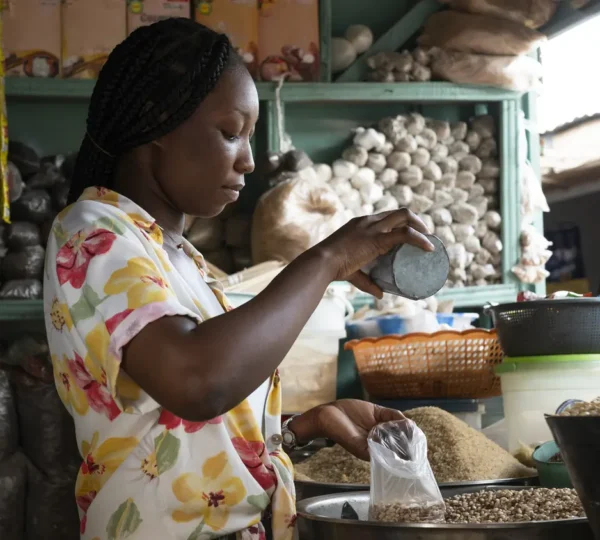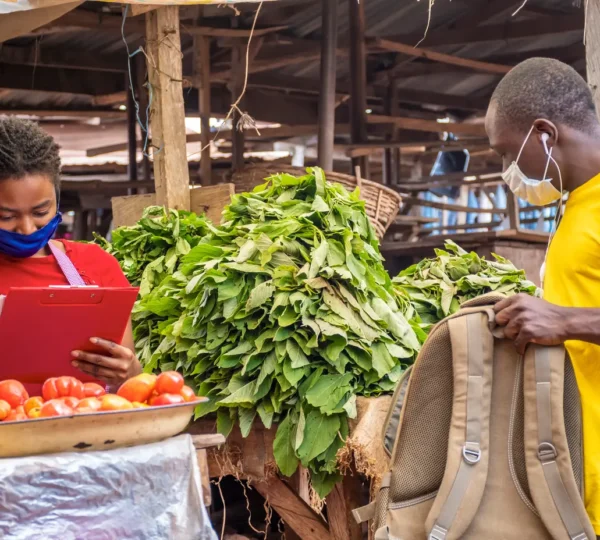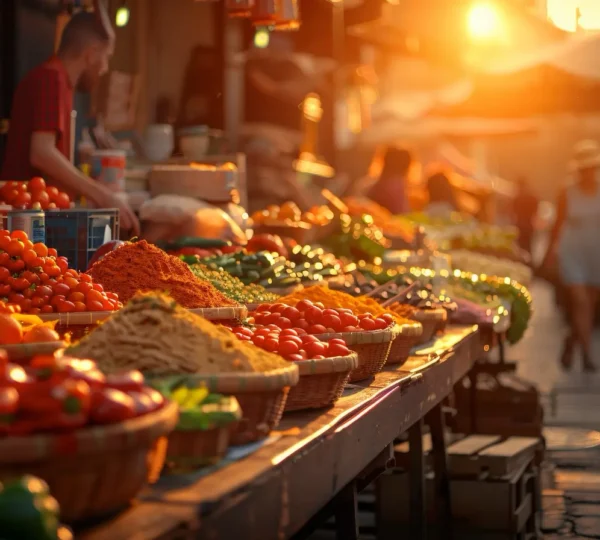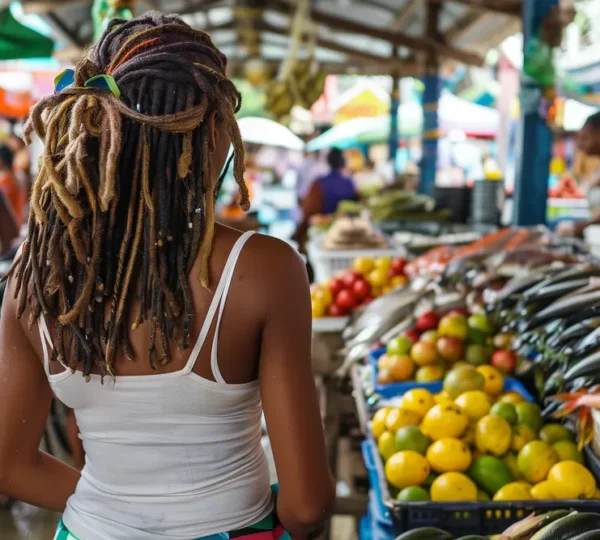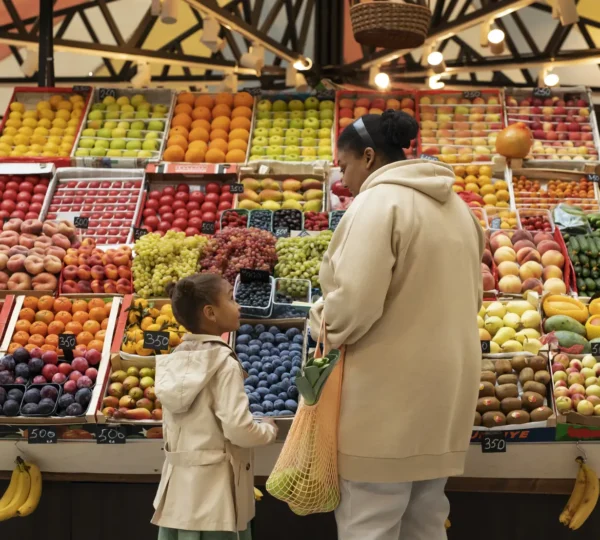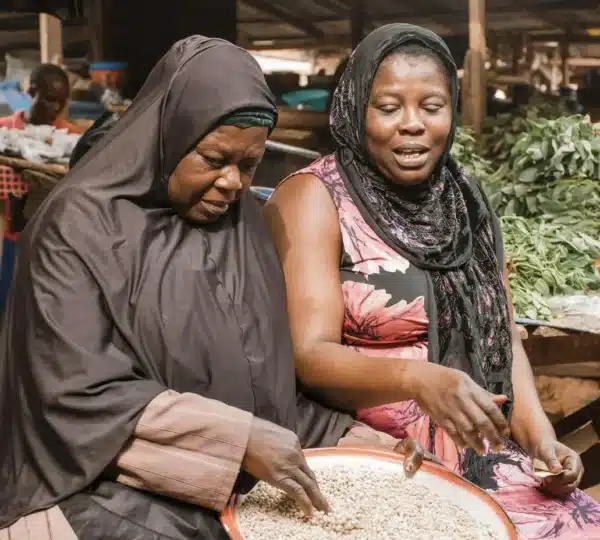If you really want to understand Lagos, don’t start with the skyscrapers or the beaches — start with the local markets in Lagos, where the city truly comes alive.
Here, vendors call out prices, the air is thick with the aroma of roasted peppers, and baskets overflow with fresh tomatoes, yams, and spices.
For food lovers, Lagos markets are more than shopping destinations — they’re cultural experiences. From age-old traditional stalls to modern farmer’s markets, every corner tells a story about Nigeria’s deep relationship with food.
Exploring local markets in Lagos is the best way to experience the city beyond its restaurants and high-rises. Each market bursts with flavor, rhythm, and color — showing exactly why local markets in Lagos are every food lover’s dream.
Here’s your guide to the best local markets in Lagos for anyone looking to taste, explore, and connect with the city through its flavors.
1. Balogun Market — The Beating Heart of Lagos Island
If Lagos had a food capital, it would be Balogun Market. Spread across the narrow streets of Lagos Island, this massive market is a maze of stalls selling almost everything — but food lovers flock here for its spices, smoked fish, beans, and local condiments.
What Makes It Special
Balogun is chaotic in the most wonderful way. You’ll see pepper sellers laughing with customers, women pounding yam in open stalls, and traders balancing trays of fruits on their heads as they weave through the crowd.
If you’re hunting for authentic Nigerian ingredients — from ogbono to crayfish — this is your paradise. You can also find ready-to-eat street snacks like puff-puff, roasted plantain (boli), and akara (bean cakes).
Local Tip
Go early in the morning when the market is busiest but not yet crowded. And if you’re new, go with a local guide or join a Naija Food Tour — Balogun is huge, and it’s easy to get lost among the colors and aromas.
2. Mile 12 Market — Lagos’ Fresh Food Powerhouse
No conversation about food in Lagos is complete without Mile 12 Market. Located in Kosofe, this market is the city’s main hub for fresh fruits and vegetables — many brought in daily from northern Nigeria.
Why Food Lovers Love It
Every restaurant owner and home cook knows Mile 12. You’ll find heaps of tomatoes, peppers, onions, yams, and plantains stacked so high it looks like an art installation.
It’s also where most Lagos food vendors source their produce — so if you want to experience where the magic of Nigerian cooking begins, this is the place.
What to Expect
Mile 12 is raw and authentic. You’ll get your hands dirty and your shoes dusty, but that’s the fun of it. Vendors are friendly, and haggling is expected. Bring cash, wear comfortable shoes, and embrace the adventure.
3. Oyingbo Market — Old Charm Meets Modern Structure
Oyingbo Market is one of Lagos’s oldest and most organized traditional markets. It recently got a facelift with a multi-storey structure, but it still retains that Lagos street energy that makes shopping exciting.
What You’ll Find
Oyingbo is known for seafood, grains, spices, and local snacks. Fishermen from the nearby lagoon supply fresh catch every morning, and women prepare local delicacies like ogiri, iru (locust beans), and dried prawns.
Best For
Food photographers and cultural tourists — the colors here are irresistible. You’ll also find plantain chips, fried yam, and sugarcane juice stalls just outside the main gates.
4. Lekki Market — Art, Culture, and Gourmet Finds
For a calmer and more tourist-friendly experience, Lekki Market (also called the Lekki Arts and Food Market) blends crafts, produce, and artisan foods.
Why It’s Unique
Here, you’ll find local honey, handmade spices, palm wine, and organic vegetables — perfect for those who love farm-to-table freshness.
It’s also a great place to pick up souvenirs while grabbing some fresh coconut water or spicy grilled fish. Many expatriates and health-conscious Lagosians shop here because it’s clean, well-arranged, and easy to navigate.
Insider Tip
Visit on a Saturday morning when farmers bring in new produce. And don’t miss the suya stand near the market gate — some locals swear it rivals the famous Glover Court Suya.
5. Ajah Market — A Blend of Traditional and Coastal Freshness
Located along the Lekki-Epe expressway, Ajah Market offers a different charm — less crowded, more coastal, and full of surprises.
What Makes It a Food Lover’s Gem
Ajah sits close to fishing communities, so the market overflows with fresh fish, prawns, and crabs, along with seasonal fruits like mangoes and pineapples.
It’s also a great place to sample local street foods. Vendors often sell roasted corn, boli, fried plantain, and akara right beside the main stalls.
Why Visit
It’s the perfect market if you want authentic Nigerian ingredients without the chaos of the bigger markets.
6. Ketu Market — Everyday Lagos Flavor
Ketu Market doesn’t get as much attention as Balogun or Mile 12, but it’s a favorite among locals for its affordable produce and street food stalls.
You’ll find small restaurants (bukas) tucked between stalls where vendors cook and serve freshly made amala, eba, and pepper soup to hungry shoppers.
What Food Lovers Will Enjoy
The mix of smells — fried fish, palm oil, pepper soup spices — feels like a sensory overload. It’s not just a place to buy food; it’s a place to taste Lagos.
7. Farmers’ Market at Freedom Park — The Modern Alternative
Every weekend, a new trend has been growing — Lagos farmers’ markets. One of the most popular is at Freedom Park, Lagos Island, where local farmers sell organic vegetables, spices, palm oil, and baked goods directly to consumers.
Why You Should Visit
It’s clean, calm, and creative — the kind of place where traditional meets modern. You’ll meet chefs, food bloggers, and small-scale farmers who love talking about their produce.
If you’re into farm-to-fork experiences, this is your Lagos paradise.
Connecting Food, Culture, and People
Lagos markets are living museums — they show what people eat, how they live, and what they value.
For food lovers, visiting them is about more than shopping; it’s about experiencing Nigerian hospitality, creativity, and resilience firsthand.
From the fiery spices of Balogun to the calm coastal breeze at Ajah, every market tells a different story — one worth tasting.
No trip is complete without spending a morning exploring local markets in Lagos with Naija Food Tour. It’s where culture meets cuisine, and where you’ll discover the most authentic ingredients in the city.
Pro Tips for Visiting Lagos Markets
-
Go early. Morning hours are best for freshness and lighter crowds.
-
Bring cash. Many vendors don’t accept transfers.
-
Haggle politely. Bargaining is part of the experience.
-
Dress light. It gets hot and crowded.
-
Go with a local or a guide. Markets like Balogun and Mile 12 can be overwhelming for first-timers.
Want to skip the confusion and get straight to the good food?
Join a Naija Food Tour — explore Lagos markets with local guides who know the best stalls, the cleanest kitchens, and the most authentic flavors.
Final Thoughts
Exploring local markets in Lagos isn’t just about shopping — it’s about tasting culture, history, and hospitality all at once. From the spicy aroma of Balogun to the colorful produce at Mile 12, each market offers something new to discover. Whether you’re a visitor or a local foodie, local markets in Lagos are where the true flavor of Nigeria comes alive.
Whether you’re a tourist or a local rediscovering your city, exploring these markets is the ultimate food lover’s adventure. You won’t just leave with a bag full of spices or yams — you’ll leave with stories, laughter, and maybe a few new recipes to try at home.
So next time you visit Lagos, don’t rush past the chaos — dive right into it.
That’s where the real flavor of Nigeria lives.

